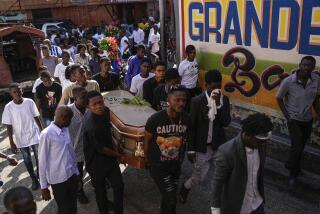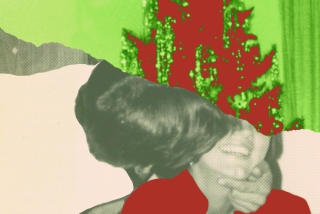Machel Mourned as Loss of Hope for Mozambique
MAPUTO, Mozambique — Silently, solemnly, the line of mourners moved slowly up the boulevard as thousands of Mozambicans came to pay their final respects Sunday to President Samora M. Machel, the man who led them to independence and the man who symbolized their hope for the country’s future.
The only sounds heard as the long line inched forward toward the Maputo City Hall, where Machel’s body lay in state, were the shuffling of feet and the rustling leaves of the trees.
“The people are silent because of their respect for Machel and because they are reflecting on what our country will be without him,” said Jorge Guebuza, a civil servant, as he moved along in the line. “This is a time to think about what Machel did for Mozambique and a time to think about what we will do without him.”
But that silence was broken as the mourners passed Machel’s casket; the reality of life without Machel, who was killed a week ago in an airplane crash on the Mozambican-South African border, seemed to hit them hard.
Many collapsed with grief in front of the massive wooden coffin and had to be helped out of the room. Women wailed, and many men, stoic through the long wait, broke down in anguished sobs as they left the building.
The cloth forage cap Machel often wore was at the foot of the coffin, a symbol of the nationalist guerrillas’ long war against the Portuguese, and his many medals, a symbol of the rebels’ eventual triumph, were on a table to the side.
Among African leaders, Machel was special--a guerrilla commander who made the transition easily to president; the hard-bitten socialist who saw his mistakes and moderated his ideology; the Soviet ally who felt comfortable in recent years in dealing with the United States, Britain, Portugal and even South Africa in order to promote Mozambique’s economic development.
For Mozambicans, the loss of Machel’s leadership seems to heighten the dangers already faced by the impoverished and drought-stricken country in the continuing civil war with right-wing guerrillas and in its increasingly tense relations with neighboring South Africa.
The lack of a clear successor to Machel as president and leader of the Front for the Liberation of Mozambique, the ruling party, has added to this uncertainty. Machel, 53, had led the party, known as Frelimo, since 1969 and had been the country’s president since it won its independence from Portugal in 1975.
Gave People Confidence
“Samora Machel gave us the confidence that, however great our problems, we would overcome them,” Agostino Hongwane, a bank clerk, said as he waited in the line of mourners with his wife and 3-year-old daughter. “People are asking themselves, ‘Who will make things work out all right now? What will become of us?’ ”
For the third day, the mourners had started coming at dawn, and they continued until midnight in an outpouring of human emotions that combined the grief over the death of an admired elder brother with those of a nation that has lost the only political leader it has known.
Peasants from outlying villages came barefoot, city residents wore their best suits and dresses, and soldiers came in crisply pressed uniforms of mottled brown and black camouflage.
“For those who say the people were no longer with Machel and were deserting Frelimo for the Renamo bandits, here is proof of Frelimo’s popular strength,” a middle-aged party official remarked, referring to the rightist guerrillas of the Mozambique National Resistance Movement, known as Renamo.
Sadness and Resolve
Shepherding more mourners into the five-block-long queue, he commented, “Look at their faces, and you see sadness, real sadness. But look at their hearts, and you will see resolve, true resolve. . . . Our people will do much to honor Samora Machel.”
Foreign delegations--from neighboring countries, from the Soviet Union and Eastern Europe, from Cuba and Nicaragua, from liberation movements such as the African National Congress of South Africa--also came to pay tribute to Machel and the revolution he had led here.
More foreign representatives, including President Reagan’s daughter Maureen, will come for Machel’s state funeral Tuesday.
The cause of the Oct. 19 crash that killed Machel and 33 others, mostly Mozambican government officials, is under investigation by aviation experts from Mozambique, from South Africa, where the plane fell while circling to land at Maputo, and from the Soviet Union, which manufactured the twin-engine jet and supplied the five-man crew.
“People don’t know what really happened, and they suspect South Africa, of course, but we are trying to keep things cool,” a Mozambican official remarked.
“We have many questions and very few answers, and that makes the people’s sadness all the deeper. For some, only when they see the casket do they believe that Machel is dead.”
More to Read
Sign up for Essential California
The most important California stories and recommendations in your inbox every morning.
You may occasionally receive promotional content from the Los Angeles Times.










